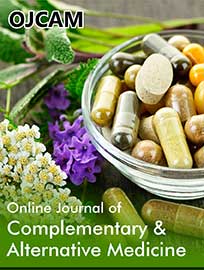 Minireview Article
Minireview Article
Chinese Medicine for Patients with Depression and Anxiety
Yaping Chen, Traditional Chinese acupuncture, United States.
Received Date:March 26, 2023; Published Date:April 04, 2023
Chinese Medicine
In my acupuncture clinic, I have had the opportunity to help many patients suffering from depression, both with and without anxiety. Many of them came to me after years of using Western medicine; either the medicine was not working for them, or it caused too many, or too intrusive, side effects.
For some patients, Western medicine works perfectly, without many side effects. For some other patients, they try all kinds of western medicines, but the medicines failed or partially failed to be good solutions for them.
Most of these patients that came to me were taking at least three Western medications: one for anxiety, one for depression and then pain medication. Many of them were also taking a muscle relaxer, some sleeping medication, and a number of them were also taking a panic medication.
It usually takes a few weeks of acupuncture treatments for the patients to feel better and to decide to continue to work with me. Some patients only need a few treatments to begin to feel a difference. Each patient is different, and therefore needs a special individual treatment plan. Depending on each patient’s situation, I may add some Chinese herb formula to help with depression and/ or anxiety, or insomnia. Most of my patients who experienced side effects from the Western medications were completely off those Western medications within three months of my treatments. Some took a much shorter time and some of them took much longer. The process of withdrawal symptoms from Western medications can be very difficult or impossible without Chinese medicine intensive treatments!
Some patients taking depression and anxiety pills came to me with stomach issues or low energy. With my treatments, they were able to continue their Western medication and then come to me for ongoing “tune ups” whenever there was some issue arising.
I have no data about the percentage of patients for whom Western medications work perfectly, since they won’t need to seek my help. For the patients who came to see me with symptoms of depression and anxiety, over ninety percent of them were managed successfully by acupuncture treatments, with or without Chinese herbs. All Stanford University students who came to me for help with depression, with or without anxiety, were able to continue and finish their graduate or undergraduate programs at Stanford.
Of course, the percentage of those students that came to me, out of all students who may have depression and/or anxiety but were successfully managed by Western medicine only, is unknown to me.
But my treatment results show that Chinese medicine with acupuncture is a very powerful and successful method to treat depression, with or without anxiety.
Is Chinese Medicine Non-scientific?
Chinese medicine treats the human body holistically to solve any problem, especially depression and anxiety with pain, viewing the body and mind as a whole, and not just focusing on one single issue or area. It does work for many people in many cases. But still there are plenty of people who have doubts about its importance in human health; some people think that “Chinese medicine lacks a scientific nature”.
In my opinion, both Chinese medicine and Western medicine, together, are a more complete way to resolving human health issues, including anxiety and depression, with or without pain.
In my book The Theory of True Love, the second principle is about the “quantifiable and non-quantifiable nature” of human beings. Chinese medicine belongs to the non-quantifiable scope, and therefore it is difficult to use a “scientific” method to prove its scientific nature. It addresses non-quantifiable issues.
Non-quantifiable issues are likely more difficult to describe or measure, and therefore perhaps more difficult to resolve. Based on both human natures (quantifiable and non-quantifiable), Chinese medicine is as important as Western medicine for us.
I hope that the medical world, and the medical insurance systems, respect both human quantifiable and non-quantifiable natures, and therefore will treat Chinese medicine and Western medicine equally.
Acknowledgement
None.
Conflict of Interest
The author declares that there is no conflict of interest.
-
Linda Berking*. Nutrition and Complementary and Alternative Medicine. On J Complement & Alt Med. 8(3): 2023. OJCAM. MS.ID.000687.
-
Yaping Chen*. Chinese Medicine for Patients with Depression and Anxiety. On J Complement & Alt Med. 8(3): 2023. OJCAM.MS.ID.000687.
-

This work is licensed under a Creative Commons Attribution-NonCommercial 4.0 International License.






